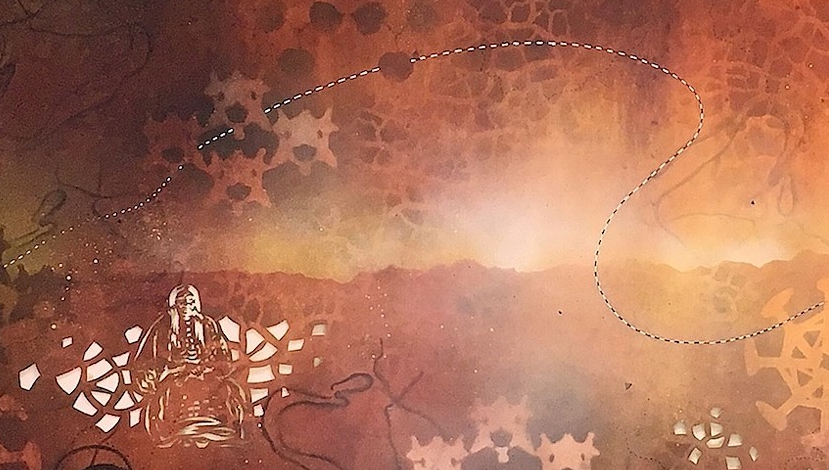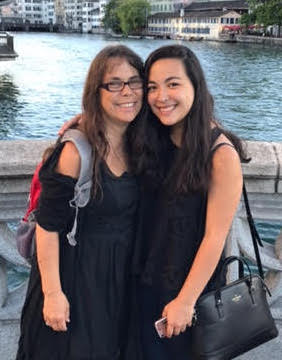Essay by Geri Lipschultz
From My Heart to Your Heart, My Daughter

I started the file on June 13, 2011. I know this for sure because the file name—Athens diary in exile—is dated. I wrote a lot that day in Long Island, about the reasons I’d gone to Ohio University for a doctorate in creative writing. I went on about the precariousness of the journey, about all the fleeting threads I was trying to capture in my journal.
Data-storing, recording, interpreting, embedding a point of view that, by its very nature, is in flux; there’s nothing solid here; words that cannot hold a thought, formless as water….
I wrote this not more than fifteen hours after returning to New York for good. It was the deal I’d made with my then nine-year-old daughter: We would return to Long Island after three years away so she could go to high school there. I would write my dissertation while continuing to work as an adjunct instructor in several New York City colleges.
I had hoped she’d change her mind. I’d hoped I would sell a novel or find a full-time job in Athens, Ohio. I’d thought putting five hundred miles of distance between my husband and me might help with our faltering marriage. I thought I’d find my way. I thought one consequence would be thinking of myself as a successful human being.
But back in Long Island, I was tired and broken-hearted. I deeply felt the loss of this dream. I’d had only a bit of sleep after the ten-hour drive, a drive I made no less than 36 times in the three years I lived in Athens. Still, I needed to write. Nothing but writing—not even my guilt for separating my daughter from her father—could help contain the bitterness I felt about leaving without actually getting the degree.
I started the diary in exile to self-comfort—to justify my having gone in the first place. I would learn the appropriate prepositions now, the linguistic turns of a fickle river or road whose course was always under construction.
I so hoped I would make up for my failure. As if words remain all that’s left for us.
I still wonder—why did I stop my entry there?
• • •
Just a few years later, the last time I visited, the house was on stilts. The landlord was moving it about fifty feet back so it could be a pool house. But in 2011, when it was my fort and my fortitude, it had a stunning basement as well as glorious bedrooms with large windows for my daughter and me. Southwestern Ohio was once home to the coal industry, and this Athens house, like many, had been equipped to accommodate coal miners. The cement- and dirt-floored basement contained a series of sturdy, if unfinished, chambers, each with a separate entrance and porcelain fixtures for washing up.
For us, the basement was home to kitty litter. But upstairs, the living room’s walls were plaster and rounded. A stairwell with thick oak railings led to the bedrooms and a room I could call my study.
It was actually our second home in Athens. In 2009, we’d had to move out of the first one, but luckily, we found this iconic Victorian down the block, where we stayed for the remaining two years.
By January of 2011, the floor of the study was overwhelmed with books, flaps of paper jutting out from the pages marking passages. Two windows looked onto East State Street, with a view of other Victorians and the sidewalks where many a student staggered home late at night shouting obscenities. A window on either side faced the houses adjacent to ours, one of which was the large Queen Anne mansion of our landlord.
Behind my desk, I hung a bulletin board and tacked up a three-by-five card on which were two sentences from an email message. I made an entry in another journal that I’m pretty sure is just this message, which I’d typed and retyped about twenty times:
Have always in mind that the world is like you dream it. You are a warrior and warriors like you never give up. Have always in mind that the world is like you dream it. You are a warrior and warriors like you never give up. Have always in mind….
It was from my friend Ipu. Ipupiara Makunaiman—Ipupiara translates as "pink dolphin" in the language of his tribe, the Ure-wau-wau. Makunaiman means "one who makes others' dreams come true," a title acknowledged by the community. His Western name was Dr. Bernardo Peixoto. A renowned shaman, he wanted my daughter to call him “Uncle Bernie.”
I had written to him of my anxiety some months before I was to take the comprehensives, the qualifying exam for my doctorate. Ipu could have judged my anxiety as petty at best, an impertinence at worst, but no—he did not judge. He supported my quest, having known me for almost a decade, visiting our town, speaking, giving healings, honoring the earth with ceremonies. In Long Island, Ipu had told my daughter’s second-grade class stories of rainforest life, how in his language there were only three numbers: “one, two, and many.” He’d taught them the word chungo: “from my heart to your heart.” But it means many other things as well.
He was born in the Manaus part of Brazil, half-indigenous, half-Brazilian, but raised in the Amazon. Living with his wife in Washington, D.C., he was a consultant for the Smithsonian, a shaman with a doctorate in anthropology.
I didn’t speak to him after he sent that message. I’d taken the comprehensives. I’d passed. But I later learned that a few weeks after he emailed me, Ipu had died. He was gone.
• • •
Not a good thing to make a deal with a child, a devil’s deal, now done for, a bird catching exhaust.
I will buy you a cell phone, yes. The stores may be second-hand or third-rate, but there will be shoes when you find yourself depressed. But look! A violin teacher, a chamber music program eighty miles up the road. What’s more, with that cell phone, you can call home. Your father’s hardly ever home anyway.
No, I didn’t say that at the time. Nor did I write the following words in my exile’s diary or anywhere else but here—this essay I’ve been trying to write for as many years as I’ve been back.
We’ll go swimming in the town pool and the university pool. You will go skiing in West Virginia, ice skating in Bird Arena, and you will see deer and signs on the supermarket that offer free flu shots and tell you not to enter with a gun.
We will feed massive numbers of hummingbirds.
You will giggle and sob with new friends you would have never met otherwise. You will fall in love with scones and carrot cupcakes and wood-smoked pizza and rice with black beans, and you will long for them years later. You will never have a bedroom as big as this one with windows so large you can see stars. A swarm of bees will think our back porch is their new home, and a man will come and brush them off, take them away so we will all live well and prosper.
We will buy hundreds of dollars’ worth of second- and third- and fourteenth-hand furniture from the local thrift stores, and we will give it all away, except for what we sell for much less than what we paid, and still we will feel grateful for having been in a kind of flow that resembles nothing of the frenzy of suburban Long Island.
As you grow into that awkward and angry and breathlessly beautiful adolescent, I will grow, too, into something grandmotherly and cerebral, as the oracle of my heart directs me to the next stitch a moment before it comes apart, the always verging on thread-less quilt.
The dream is about these words, hoping to catch each word that falls on my lap before it’s whisked aside, caught by a finger that never tires of pressing the thread and will still press, when both the thread and the finger are gone—on you, my daughter, and on your daughter, and it will seem to end. It will never not seem to end.
Art Information
- “Patterns of Privilege - Say Her Name” (detail) © Kathleen Caprario; used by permission.
 Geri Lipschultz has been published in the Los Angeles Review of Books, Ms., New York Times, Toast, Black Warrior Review, great weather for MEDIA, among others. She has a story and poem in Pearson's college literature anthology, and her one-woman show (Once Upon the Present Time) was produced in New York City by Woodie King, Jr.
Geri Lipschultz has been published in the Los Angeles Review of Books, Ms., New York Times, Toast, Black Warrior Review, great weather for MEDIA, among others. She has a story and poem in Pearson's college literature anthology, and her one-woman show (Once Upon the Present Time) was produced in New York City by Woodie King, Jr.
Lipschultz received an MFA from the University of Iowa and a PhD from Ohio University. She teaches at Hunter College and Borough of Manhattan Community College.
She recently told TW that her daughter also wrote about their time in Athens, Ohio, for her college essay. Moved, Lipschultz asked whether she’d like to read an early version of this essay. After reading it, her daughter broke into tears.
For more information, visit Geri Lipschultz’s website or follow her @alicebluegown1.
